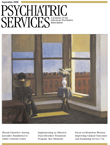Letter
Hospital Readmission and Its Correlates Among Psychiatric Patients in Taiwan
To the Editor: A high readmission rate among persons discharged from inpatient psychiatric treatment may reflect the fact that the community lacks adequate accommodations for such patients and can be used as an indicator of inadequacy or inappropriateness of community-based aftercare ( 1 ). A wide range of psychiatric readmission rates has been reported in the literature, mainly because studies use various time intervals. Reported rates have ranged from 10% readmission within one month after hospital discharge to as high as 47% within one year ( 2 , 3 ).
Data on readmission of psychiatric patients in Asian societies are limited. We used a registry-based cohort design to estimate the short-term readmission rate—within 60 days—among 1,813 patients discharged from a psychiatric hospital between November 2003 and October 2005 in northwestern Taiwan.
Readmission rates were 6% within 14 days, 9% within 30 days, and 12% within 60 days. Patients who received the scheduled ambulatory follow-up had a significantly higher risk of readmission within 60 days, after adjustment for potential confounders (adjusted odds ratio [AOR]=1.89, 95% confidence interval [CI]=1.33–2.69), and those who attended community rehabilitation programs were significantly less likely to be readmitted (AOR=.33, CI=.12–.96). Less impaired patients may be more likely to be referred to rehabilitation programs, which may partly explain the lower readmission rate.
Among patients with schizophrenia, those who had a hospital stay longer than 60 days had significantly increased risk of readmission within 14 days (AOR=1.96, CI=1.06–3.62) and within 30 days (AOR=1.81, CI=1.07–3.09) compared with those whose duration of stay was between 30 and 60 days. Patients who are more impaired may need to stay longer in the hospital, and more impaired patients may be at an increased risk of rehospitalization.
Similar to findings from studies in Western societies, our results indicate that about one-tenth of psychiatric patients in Taiwan were readmitted within one month after discharge ( 4 ). The readmission rate increased only slightly (by 3%) by two months after discharge. Our study also showed a positive association between attending a follow-up ambulatory care visit and readmission, which is consistent with the report by Thompson and colleagues ( 5 ), which concluded that patients who attended an initial ambulatory care visit after discharge were likely to seek outpatient care on a regular basis. These patients may either have a poor prognosis or frequent contact with psychiatrists; the closer supervision associated with aftercare may lead to a greater likelihood of rehospitalization.
Although the readmission rate was not substantially high in Taiwan, local clinicians and health policy makers should nevertheless acknowledge the importance of rehospitalization among psychiatric patients. Future investigations should explore specific forms of aftercare and types of services that can ensure that discharged psychiatric patients remain in the community. Moreover, better management of patients with schizophrenia who have longer hospital stays may help to reduce the likelihood of readmission in the first month after discharge.
Acknowledgments and disclosures
This study was supported by grant NSC-96-2314-B-130-002 from the National Scientific Council of Taiwan.
The authors report no competing interests.
1. Thornicroft G, Gooch C, Dayson D: Readmissions to hospital for long term psychiatric patients after discharge to the community. British Medical Journal 305:996–998, 1992Google Scholar
2. Fisher HW, Geller JL, Altaffer F, et al: The relationship between community resources and state hospital recidivism. American Journal of Psychiatry 149:385–390, 1992Google Scholar
3. Klinkenberg WD, Calsyn RJ: Predictors of receipt of aftercare and recidivism among persons with severe mental illness: a review. Psychiatry Services 47:487–496, 1996Google Scholar
4. Appleby L, Desai PN, Luchins DJ, et al: Length of stay and recidivism in schizophrenia. American Journal of Psychiatry 150:72–76, 1993Google Scholar
5. Thompson EE, Neighbors HW, Munday C, et al: Length of stay, referral to aftercare, and rehospitalization among psychiatric inpatients. Psychiatric Services 54:1271–1276, 2003Google Scholar



